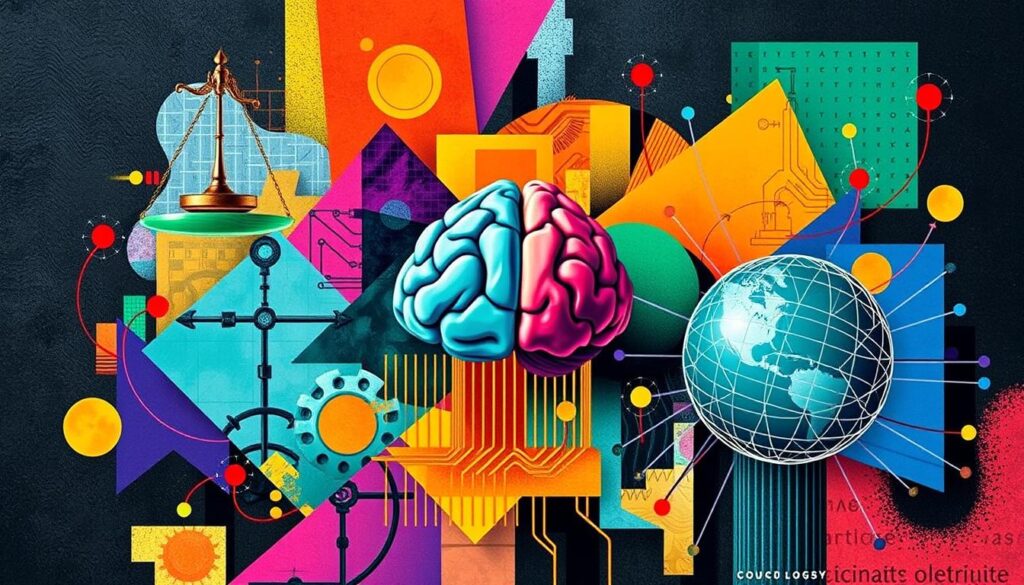Did you know over 80% of consumers worry about AI’s ethics in their daily lives? As tech advances fast, AI ethics become more critical. We’ll explore why responsible AI practices are vital in today’s world.
International groups see the need for ethical AI rules. The European Union and big tech like Google and Microsoft agree. They focus on key AI ethics like being open, accountable, and protecting people’s rights12. But, AI’s growing power raises questions about fairness, who’s to blame, and how clear it is.
In this article, you’ll learn about AI’s ethics and its impact on our future. Strong rules are needed to make sure AI benefits everyone. By following these ethics, we can make the digital world fairer and safer.
Key Takeaways
- Understanding AI ethics is essential as technology continues to evolve rapidly.
- Organizations are increasingly recognizing the need for responsible AI frameworks.
- Key ethical principles include transparency, accountability, and protecting individual rights.
- Bias in AI and the implications of AI decisions require careful consideration.
- Contributing to AI ethics promotes a more equitable digital landscape.
Understanding AI Ethics
AI ethics is a field that sets moral rules for AI tech. As AI grows in society, we need to make sure it helps us and doesn’t harm us. Ethics is not just a theory; it’s how AI affects us all.
What is AI Ethics?
AI ethics is a study that aims to make AI good for us. In 2016, a report by the National Science and Technology Council talked about AI’s role in society3. It covers how AI affects us, the economy, and security. This helps set standards for using AI responsibly.
Importance of AI Ethics
AI ethics is key to protecting our rights and building trust in tech. In 2021, UNESCO made a global AI ethics agreement with 193 countries3. It focuses on human rights and dignity. It also tackles issues like bias, privacy, and the environmental impact of AI3.
Key Principles of Ethical AI
Principles like fairness, accountability, and privacy guide ethical AI. These values shape how AI treats us4. But, poor research and biased data can cause problems4. Good ethics in AI helps avoid these issues and improves tech quality.
The Rise of Responsible AI
Responsible AI is now a key topic in ethical AI development. It means making AI systems that are fair, open, and follow the law. As AI changes many industries, it’s important to use it wisely to avoid harm and ensure fairness.
Definition of Responsible AI
Responsible AI follows rules that make AI fair and safe. It aims to avoid harm and ensure AI is transparent. This is especially important in areas like loans and criminal justice5. With more money going into AI, making it responsible is more important than ever6.
Role of Stakeholders in Responsible AI
Many people must work together for responsible AI to succeed. Developers, users, and policymakers all have important roles. They help make AI fair and open by working together and listening to each other7.
Examples of Responsible AI Practices
Many fields are using AI in a responsible way. For example, in healthcare, AI helps doctors diagnose while keeping ethics in mind. Companies are using diverse data and clear AI tools to be more open7. Here are some examples of responsible AI in action:
| Industry | Responsible AI Practice |
|---|---|
| Healthcare | Using AI for diagnostic purposes while implementing rigorous impact assessments on patient data |
| Finance | Employing diverse data sets to reduce bias in loan approval algorithms |
| Retail | Utilizing AI to analyze consumer behavior while ensuring compliance with data protection regulations |
| Technology | Incorporating explainable AI systems to promote understanding of AI decisions among end-users |
Using responsible AI helps avoid risks and encourages new ideas. It helps companies deal with changing ethical rules675.
Ethical Considerations in AI Development
As AI technology advances, ethical concerns grow. It’s crucial to understand and tackle these issues to avoid negative impacts on society.
Bias in AI Models
Bias in AI is a big ethical problem. Algorithms learn from data that may show biases. This can lead to unfair treatment based on race, gender, and more.
Several U.S. agencies have warned about AI model discrimination8. Companies need to work on making their AI systems fair. This ensures equal outcomes in various industries. Ignoring these biases could worsen existing inequalities and harm vulnerable groups9.
Transparency in AI Algorithms
AI transparency is key to ethical development. Users need to know how AI systems work and make decisions. This builds trust8.
Explaining AI is vital. It helps understand AI’s actions and builds confidence in its reliability109.
Privacy and Data Protection
Protecting user data is essential in AI development. AI uses a lot of data, so privacy and protection must be a top priority8. Recent privacy breaches show the need for strong security.
AI’s growth must not compromise individual privacy rights. Strong regulations are needed to protect data usage for everyone’s benefit9.

Accountability in AI Systems
Understanding AI accountability is key in dealing with AI’s complex decisions. As AI grows, it’s hard to figure out who’s responsible for its actions. This is especially true for large language models made in secret. We need strong rules to make AI decisions fair and right.
Defining Accountability in AI
Accountability in AI means knowing who’s behind AI’s choices. Most leaders think AI will give them an edge, making clear rules even more important11. So, everyone in the field must work together to figure out who’s to blame for AI’s mistakes.
Liability for AI Decisions
People and companies should be ready to face the consequences of AI’s actions11. The GDPR in Europe makes it clear that we need to explain AI’s decisions12. Being open and clear is crucial to avoid AI’s biases and unfairness11.
Mechanisms for Accountability
There are ways to make AI more accountable. The UK has a plan to help use AI ethically13. Regular checks are needed to make sure AI acts right11. Also, using Explainable AI (XAI) helps us understand AI’s choices better, building trust11.
The Role of Regulation in AI Ethics
The world of AI governance is changing fast. We need rules that tackle the big ethical issues AI brings up. Companies are under pressure to follow laws and think about new rules for their AI plans. As AI becomes more common in many areas, it’s clear we need clear ethical rules for AI.
Current Regulatory Landscape
AI rules are being made in different ways around the world. Some places are ahead, while others are still working on it. For example, only 35% of people trust how AI is used by companies14. This shows a big trust problem that rules need to fix.
Also, 77% of people think companies should be blamed if AI is used wrongly14. This highlights the need for strong rules. It pushes companies to be open and take responsibility.
Proposed Regulations and Their Impacts
New rules aim to set clear standards for ethical AI. They focus on things like fairness, transparency, and privacy14. These rules help make sure AI is used in ways that are fair and trustworthy.
Companies like IBM are pushing for rules that balance new tech with trust and responsibility15. They want to make sure AI is checked by humans and deals with problems like deepfakes15.
Importance of Collaboration in Regulation
Working together is key to making good AI rules. IBM works with groups like the Data & Trust Alliance and the University of Notre Dame15. They work on solving ethical problems and teach about AI reporting15.
This teamwork helps make AI rules better and more real. In a world that relies more on AI, focusing on responsible AI is crucial. It makes decisions and risk management better.

AI Ethics in Real-World Applications
AI ethics is crucial in many fields. Healthcare, finance, and employment face big challenges. They need to understand AI’s impact well. Companies must use AI responsibly, following strict ethical guidelines.
AI in Healthcare
AI in healthcare can greatly improve patient care. But, there are big ethical issues. For example, biased data can harm certain groups16.
It’s important to protect patient data and be open about AI use. Regular checks are needed to avoid problems16.
AI in Finance
AI in finance makes things faster and smarter. But, it can also discriminate unfairly. Most people want companies to be responsible for AI misuse17.
Financial firms need strong AI rules. These rules should ensure fairness and clear data use.
AI in Employment
AI in job searches aims to make things better. But, it can also be biased. Research shows it might overlook certain groups17.
It’s key to address these issues. Businesses should use AI fairly and openly. This way, everyone can benefit from AI’s power.

Knowing the difference between ethical AI and responsible AI is vital. Ethical AI is more than rules. It’s about creating trustworthy technology16.
Challenges in Implementing Ethical AI
Using ethical AI is hard and slows down progress in many fields. Companies struggle to make AI work right with ethics. This makes it tough to use AI well.
Technical Challenges
One big problem is making AI systems clear and fair. These systems can only be as good as the data they use18. If the data is bad, the results will be too18.
Also, AI can be biased, showing what its creators value18. This means we need to keep working to make AI fair for everyone18.
Organizational Resistance
Some companies don’t get or care about ethics in AI. For example, Amazon faced criticism for a biased AI tool19. This makes it hard for them to follow ethical guidelines.
It also slows down the use of ethical AI. Companies have different ways of handling ethics in AI, making it hard to work together18.
Cultural Considerations
Culture plays a big role in how companies use AI. Changing to be more inclusive can be hard, especially if it challenges the status quo. Different industries have different views on ethics, making it tough to work together18.

Stakeholder Perspectives on AI Ethics
It’s important to understand the different views on AI ethics. This helps organizations work better together. We look at what developers, users, and policymakers think about AI’s ethics.
Insights from Developers
AI developers come from many places like big companies and schools. They focus on making AI fair, open, and accountable. They also work on fixing bias and privacy issues.
Companies like Microsoft and Google are changing how they hire. They want to make sure their AI work is ethical2021.
Views from Users
People using AI want to know how it works. They need clear information. This helps them make good choices.
Trust is key. It makes users feel safe and helps improve AI2021.
Opinions from Policymakers
Policymakers help make rules for AI. They focus on making sure AI is used right. This includes being fair and open.
They also worry about legal issues. Companies need to follow these rules to avoid problems2122.

Working together helps everyone understand AI ethics better. This leads to better technology for all. For more on AI and ethics, check out this resource20.
Future of Ethical AI Development
The world of artificial intelligence is changing fast, with a big push for ethical AI. New trends show a move towards more responsible AI making. Things like explainable AI and fairness algorithms are being used to solve big ethical problems.
Trends in Ethical AI
Groups like governments, organizations, and schools are working together on AI ethics. The European Union has a plan that focuses on being open, accountable, and protecting people’s rights in AI1. Countries like Singapore and Canada are also making guidelines for AI that focus on fairness and people first1.
Innovations Promoting AI Ethics
Big companies are making ethics a top priority in AI. For example, Google has AI Principles to help make AI better and more beneficial1. Microsoft is also focusing on being accountable and inclusive in AI1. This shows a big commitment to making AI ethical.
The Role of Education in AI Ethics
Education is key in teaching about the ethics of AI. Teaching future developers about responsible AI helps them tackle ethical issues. As AI gets used more in different fields, it’s important to teach the public about its effects23. Teaching these values early helps build a future that values ethical AI.
Building an Ethical AI Framework
Creating an ethical AI framework is key for any company using artificial intelligence. It makes sure AI is used fairly, with accountability, and openly. This approach follows the latest in AI development, leading to trustworthy innovation.
Components of an Ethical AI Framework
An ethical AI framework has important parts. It starts with setting values and norms for AI use in the company. It also looks at AI practices company-wide, promoting responsible actions and policies24.
Also, it’s vital to be open about AI, so everyone knows how it works and its possible biases25.
Best Practices for Ethical AI Development
Good practices for ethical AI include several steps. These are:
- Having an ethics leader to check AI projects for ethics.
- Working together across different teams for diverse views in AI.
- Creating an ethical framework that fits your company’s goals.
- Setting clear goals for ethical AI use.
- Listening to many opinions to deepen AI ethics talks.
- Looking at both legal and ethical sides of AI.
By following these steps, you can make your AI framework better. This improves accountability and follows the best AI development practices24.
Assessing AI Ethics in Your Organization
It’s important to check the ethics of AI projects often. Companies should use specific methods and tools for this. They can also do surveys to see what people think about AI ethics.
Using frameworks like the NIST AI Risk Management Framework helps a lot. It gives insights into managing AI risks and promotes responsible AI use24.
Conclusion: Embracing AI Ethics
In the world of artificial intelligence, it’s crucial to embrace AI ethics. This is not just a choice; it’s a must for trust and credibility. As AI evolves, so do the ethical challenges it brings. For example, biased AI can unfairly treat people, harming reputations and trust26.
By focusing on AI ethics education, you help create a culture of accountability and openness. This is key for your organization’s success.
The Importance of Continuous Learning
Recent failures of AI, like misidentifying athletes, show we must stay alert27. Learning continuously is essential for making AI fair and reliable. This knowledge lets you follow best practices for ethical AI, making sure it serves society’s values.
Engaging with the AI Community
Talking about AI ethics with others is vital. As new tech emerges, we must discuss its ethical sides. Working together helps us understand and tackle issues like bias and the need for human-focused AI28.
By joining these conversations, you can push for AI that’s fair, open, and accountable. This is crucial for AI’s positive impact on society.
Your Role in Promoting Ethical AI
You can shape AI use in your company by promoting ethics. This means tackling biases, protecting data, and following rules26. By doing this, you help create a culture of responsibility in AI.
This effort ensures AI is used for the greater good, not for causing problems. Your actions can make a big difference in AI’s future.
FAQ
What is AI ethics?
Why is AI ethics important?
What are the key principles of ethical AI?
How do we define responsible AI?
Who are the stakeholders in responsible AI?
Can you provide examples of responsible AI practices?
What is the significance of bias in AI models?
How do transparency and interpretability impact AI algorithms?
Why is privacy and data protection important in AI?
How is accountability defined in AI systems?
What mechanisms can ensure accountability in AI systems?
What does the current regulatory landscape for AI ethics look like?
Why is collaboration among stakeholders essential in AI ethics?
How does AI ethics manifest in different industries?
What are the technical challenges in implementing ethical AI?
How can organizations overcome resistance to ethical AI practices?
What insights do stakeholders have regarding AI ethics?
What trends are emerging in the future of ethical AI?
How can education drive ethical considerations in AI?
What are the essential components of an ethical AI framework?
Source Links
- Key principles for ethical AI development – https://transcend.io/blog/ai-ethics
- Responsible AI: Ethics, Challenges, and Benefits – https://www.dasca.org/world-of-data-science/article/responsible-ai-ethics-challenges-and-benefits
- AI Ethics: What It Is and Why It Matters – https://www.coursera.org/articles/ai-ethics
- What is AI Ethics? | IBM – https://www.ibm.com/topics/ai-ethics
- Responsible AI vs. ethical AI: What’s the difference? | TechTarget – https://www.techtarget.com/searchenterpriseai/feature/Responsible-AI-vs-ethical-AI-Whats-the-difference
- Ethical concerns mount as AI takes bigger decision-making role – https://news.harvard.edu/gazette/story/2020/10/ethical-concerns-mount-as-ai-takes-bigger-decision-making-role/
- Responsible AI: Key Principles and Best Practices | Atlassian – https://www.atlassian.com/blog/artificial-intelligence/responsible-ai
- 10 Ethical Considerations – https://www.cognilytica.com/top-10-ethical-considerations-for-ai-projects/
- Ethical Considerations in AI Development – https://www.linkedin.com/pulse/ethical-considerations-ai-development-quarks-technosoft-pvt-ltd–jk9tc
- The Ethical Considerations of Artificial Intelligence | Capitol Technology University – https://www.captechu.edu/blog/ethical-considerations-of-artificial-intelligence
- AI Risk Management: Transparency & Accountability | Lumenova AI – https://www.lumenova.ai/blog/ai-risk-management-importance-of-transparency-and-accountability/
- AI Accountability and Responsibility | AI Ethics Class Notes – https://fiveable.me/artificial-intelligence-and-ethics/unit-6
- AI accountability – https://www.carnegiecouncil.org/explore-engage/key-terms/ai-accountability
- Responsible AI | AI Ethics & Governance | Accenture – https://www.accenture.com/co-es/services/applied-intelligence/ai-ethics-governance
- AI Ethics | IBM – https://www.ibm.com/impact/ai-ethics
- Responsible AI: How to make your enterprise ethical, so that your AI is too – https://dxc.com/us/en/insights/perspectives/paper/responsible-ai
- Ethical AI and ML: An Expertise-Driven Approach – https://tech-stack.com/blog/ethical-ai-and-ml-an-expertise-driven-approach-to-responsible-product-development/
- Common ethical challenges in AI – Human Rights and Biomedicine – www.coe.int – https://www.coe.int/en/web/bioethics/common-ethical-challenges-in-ai
- Navigating Ethical AI: Challenges and Strategies Involved! – https://www.markovml.com/blog/ethical-ai
- Who is Accountable for AI: The Role of Stakeholder Engagement in Responsible AI | Lumenova AI – https://www.lumenova.ai/blog/responsible-ai-accountability-stakeholder-engagement/
- Building a responsible AI: How to manage the AI ethics debate – https://www.iso.org/artificial-intelligence/responsible-ai-ethics
- Embedding responsibility in intelligent systems: from AI ethics to responsible AI ecosystems – Scientific Reports – https://www.nature.com/articles/s41598-023-34622-w
- Ethical AI: Principles, Best Practices, and Implications – https://rtslabs.com/ensuring-ethical-use-ai-principles-best-practices-implications/
- 10 top resources to build an ethical AI framework | TechTarget – https://www.techtarget.com/searchenterpriseai/feature/Top-resources-to-build-an-ethical-AI-framework
- A framework for AI ethics – https://ethics-of-ai.mooc.fi/chapter-1/4-a-framework-for-ai-ethics
- AI Ethics: What Is It and Why It Matters for Your Business – https://www.imd.org/blog/digital-transformation/ai-ethics/
- AI Ethics : The Ethical Landscape of Artificial Intelligence – https://www.xenonstack.com/blog/ethics-artificial-intelligence
- AI Ethics: The Importance of Responsible AI Development – https://www.linkedin.com/pulse/ai-ethics-importance-responsible-development-robert-san-diego-ycrme



